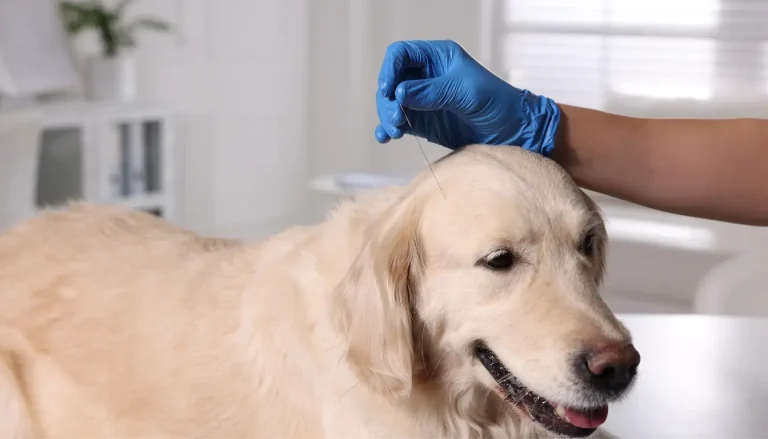In today’s world, pet owners are increasingly turning to natural remedies to ensure the well-being of their beloved animals. The trend toward holistic care reflects a desire to avoid the potential side effects of conventional medications. Natural pet healing, particularly using medicinal plants, offers a safe and effective alternative for treating common ailments in pets. Learn how to use these natural remedies, pet owners can provide their furry friends with gentle, yet powerful healing solutions.

Understanding Natural Pet Healing
Natural pet healing involves the use of non-conventional therapies, such as herbal medicine, to address various health issues in pets. This approach emphasizes the body’s innate ability to heal itself, supported by natural substances. Herbal remedies, derived from plants, have been used for centuries to treat a wide range of ailments in both humans and animals. By harnessing the power of these plants, pet owners can offer their pets relief from common conditions without relying on pharmaceuticals.
Pets, like humans, can suffer from various ailments that affect their quality of life. Understanding the symptoms of these common conditions can help pet owners identify when their pets need assistance. Some of the most frequent health issues in pets include anxiety, digestive problems, and skin conditions. Recognizing the signs of these ailments is crucial for providing timely and effective treatment.
Anxiety in Pets
Anxiety is a common issue in pets, particularly dogs and cats. It can be triggered by various factors such as loud noises, separation from their owners, or changes in their environment. A pet suffering from anxiety may exhibit several behavioral and physical symptoms.
Behavioral signs of anxiety include excessive barking or meowing, restlessness, and destructive behavior like chewing on furniture or digging. Pets may also show signs of depression, such as loss of interest in playing or interacting with their owners. Additionally, they might cling to their owners more than usual or become unusually aggressive.
Physically, an anxious pet may pant excessively, drool, or tremble. They might also exhibit changes in their eating and sleeping patterns, such as loss of appetite or insomnia. In severe cases, anxiety can lead to self-harming behaviors like excessive licking or biting, which can cause skin wounds and infections.
Digestive Issues in Pets
Digestive problems are another common health issue in pets, affecting their overall well-being and energy levels. Symptoms of digestive issues can vary depending on the underlying cause, but common signs include vomiting, diarrhea, and constipation.
A pet with digestive problems might also show a decreased appetite or an increased desire to eat grass, which they often do to induce vomiting and alleviate nausea. Additionally, you might notice changes in their stool, such as the presence of blood or mucus, which can indicate inflammation or infection in the gastrointestinal tract.
Other signs of digestive issues include abdominal pain and bloating. Pets may whine, whimper, or show discomfort when their abdomen is touched. They might also exhibit lethargy and a lack of interest in activities they usually enjoy. Chronic digestive issues can lead to weight loss and dehydration, making it essential to address these symptoms promptly.
Skin Conditions in Pets
Skin problems are prevalent in pets and can arise from various causes, including allergies, parasites, infections, and underlying health conditions. Observing your pet’s skin and coat can help identify these issues early and seek appropriate treatment.
Common skin conditions include allergies, which can be triggered by food, environmental factors, or contact with certain substances. Allergic reactions often cause itching, redness, and swelling, leading pets to scratch, lick, or bite the affected areas excessively. This behavior can result in hair loss, sores, and secondary infections.
Parasites like fleas and ticks are another frequent cause of skin problems. Infestations can lead to intense itching and discomfort, and the presence of parasites can usually be detected by inspecting your pet’s skin and coat for small, dark spots or the parasites themselves.
Infections, whether bacterial, fungal, or yeast, can also affect the skin. Symptoms of skin infections include redness, swelling, oozing, and a foul odor. Fungal infections, such as ringworm, can cause circular, hairless patches on the skin.
Other skin conditions include hot spots, which are areas of acute inflammation that can develop rapidly due to excessive licking or scratching. Hot spots are typically red, moist, and painful, requiring prompt treatment to prevent further complications.
Top Medicinal Plants for Pet Healing
Certain medicinal plants stand out for their effectiveness in treating common pet ailments. These plants are known for their healing properties and minimal side effects. Some of the top medicinal plants for pet healing include chamomile, aloe vera, calendula, and ginger.
Chamomile: Calming and Anti-Inflammatory
Chamomile is renowned for its calming effects, making it an excellent remedy for pets experiencing anxiety or stress. It also possesses anti-inflammatory properties, which can help reduce pain and swelling. Chamomile can be administered as a tea or used topically to soothe irritated skin.
To incorporate Natural Pet Healing for anxiety, use chamomile by preparing a weak chamomile tea. Steep a teaspoon of dried chamomile flowers in a cup of hot water for about 5 minutes. Allow the tea to cool, then offer it to your pet. For small pets like cats and small dogs, one to two teaspoons of chamomile tea twice a day is sufficient. For larger dogs, up to half a cup twice a day can be given. Chamomile can be used for several days to a week, depending on the severity of the anxiety. For topical application, a chamomile tea rinse can be used once daily on irritated skin until the condition improves.
Aloe Vera: Soothing Skin Irritations
Aloe vera is a versatile plant known for its soothing and healing properties. It is particularly effective in treating skin irritations, such as hot spots and rashes. The gel from the aloe vera plant can be applied directly to the affected area to provide immediate relief and promote healing.
To treat skin irritations, apply a thin layer of aloe vera gel directly from the plant to the affected area two to three times a day. Aloe vera can be used for several days until the skin irritation subsides. For more severe conditions, it can be used for up to a week. Ensure that pets do not lick the gel off immediately after application, as it may cause mild gastrointestinal upset.
Calendula: Healing Wounds and Infections
Calendula, also known as marigold, is a powerful healing plant with antimicrobial properties. It is effective in treating wounds, cuts, and infections. Calendula can be used as a tincture or ointment to speed up the healing process and prevent infection.
For wound care, clean the affected area with a mild antiseptic solution. Apply calendula ointment or tincture directly to the wound two to three times a day. For a homemade calendula rinse, steep a tablespoon of dried calendula flowers in a cup of boiling water, let it cool, and use it to rinse the wound. Continue this treatment for up to a week or until the wound heals.
Ginger: Digestive Aid
Ginger is well-known for its ability to aid digestion. It can help alleviate nausea, vomiting, and other digestive issues in pets. Ginger can be administered in small amounts, either fresh or dried, to support digestive health and improve appetite.
For digestive issues, small amounts of fresh grated ginger or powdered ginger can be added to your pet’s food. In small pets, such as cats and small dogs, a pinch of powdered ginger or a small slice of fresh ginger (about the size of a pea) once a day is sufficient. To larger dogs, a quarter to half a teaspoon of powdered ginger or a larger slice of fresh ginger can be given once a day. Ginger can be used for a few days to a week, depending on the severity of the digestive issue.
Case Studies: Success Stories
Real-life success stories highlight the effectiveness of medicinal plants in pet healing. These case studies provide valuable insights into how natural remedies can improve the health and well-being of pets.
Success Story 1: Chamomile for Anxiety
Emma, a golden retriever, had always been a loving and playful dog, but thunderstorms turned her into a nervous wreck. Emma’s owner, Sarah, noticed that during storms, Emma would pace around the house, whine incessantly, and try to hide in small spaces. This behavior was distressing for both Emma and Sarah.
Sarah decided to try chamomile tea as a natural remedy for Emma’s anxiety. She brewed a weak chamomile tea and let it cool before offering it to Emma. At first, Emma was hesitant, but with a bit of coaxing, she drank it. Sarah started giving Emma one to two teaspoons of chamomile tea twice a day, especially on days when thunderstorms were forecasted.
The results were remarkable. Emma became noticeably calmer during storms. She still showed some signs of nervousness, but the pacing and whining significantly reduced. Over time, Emma even started to relax enough to nap during thunderstorms. Sarah continued this regimen for a few weeks and was thrilled with the positive change in Emma’s behavior.
Success Story 2: Aloe Vera for Hot Spots
Mittens, a long-haired Persian cat, suffered from chronic hot spots that caused her immense discomfort. These inflamed, moist areas of skin would appear suddenly and were often exacerbated by Mittens’ constant licking and scratching. Her owner, John, tried various treatments, but the hot spots kept returning.
John decided to try aloe vera after reading about its soothing and healing properties. He carefully applied a thin layer of fresh aloe vera gel to Mittens’ hot spots two to three times a day. To prevent Mittens from licking off the gel, John kept her occupied with her favorite toys and treats after each application.
Within a few days, John noticed a significant improvement. The redness and swelling reduced, and Mittens seemed less bothered by the hot spots. The affected areas began to heal, and the fur started to grow back. John continued using aloe vera for a week, and the hot spots healed completely. He was delighted to find a natural remedy that worked so well for Mittens and continued to use aloe vera for any future skin irritations.
Integrating Medicinal Plants into Diet
Incorporating medicinal plants into a pet’s diet can provide ongoing health benefits. This approach ensures that pets receive the therapeutic properties of the plants regularly, supporting overall wellness. Here are four easy-to-prepare homemade herbal remedies that you can make for your pets:

Oatmeal and Chamomile Calming Treats
These treats are excellent for pets suffering from anxiety or stress. The combination of chamomile and oatmeal provides calming effects and helps soothe the digestive system.
Ingredients:
- 1 cup rolled oats
- 1 cup whole wheat flour
- 1 tablespoon dried chamomile flowers
- 1/2 cup unsweetened applesauce
- 1/4 cup water
Instructions:
- Preheat your oven to 350°F (175°C).
- Grind the rolled oats and dried chamomile flowers in a blender or food processor until they become a fine powder.
- In a mixing bowl, combine the oat-chamomile mixture, whole wheat flour, and applesauce.
- Gradually add water until the dough comes together.
- Roll out the dough on a floured surface and cut into small, bite-sized shapes.
- Place the treats on a baking sheet lined with parchment paper.
- Bake for 15-20 minutes or until golden brown.
- Allow the treats to cool completely before serving.
Dosage:
- Small pets (cats and small dogs): 1-2 treats per day
- Medium dogs: 2-3 treats per day
- Large dogs: 3-4 treats per day
Aloe Vera and Coconut Oil Skin Balm
This soothing balm is perfect for treating skin irritations, hot spots, and minor wounds. The combination of aloe vera and coconut oil promotes healing and provides relief from itching.
Ingredients:
- 1/4 cup pure aloe vera gel
- 1/4 cup coconut oil
- 1 tablespoon beeswax (optional, for a firmer consistency)
Instructions:
- If using beeswax, melt it in a double boiler over low heat.
- Once melted, add the coconut oil and continue to heat until fully melted and combined.
- Remove from heat and let cool slightly.
- Stir in the aloe vera gel until well combined.
- Pour the mixture into a clean container and let it cool and solidify completely.
Application:
- Apply a small amount of balm to the affected area two to three times a day.
- Prevent your pet from licking the treated area for at least 10-15 minutes after application.
Calendula Wound Spray
This easy-to-make spray is ideal for cleaning and promoting the healing of minor cuts, scrapes, and wounds. Calendula’s antimicrobial properties help prevent infection.
Ingredients:
- 1 tablespoon dried calendula flowers
- 1 cup boiling water
- 1/4 teaspoon salt
Instructions:
- Steep the dried calendula flowers in boiling water for about 15 minutes.
- Strain the liquid to remove the flowers.
- Add the salt to the calendula-infused water and stir until dissolved.
- Pour the mixture into a clean spray bottle.
Application:
- Clean the wound with the spray two to three times a day.
- Allow the area to air dry or gently pat dry with a clean cloth.
Ginger and Pumpkin Digestive Aid Biscuits
These biscuits are great for pets with digestive issues such as nausea, vomiting, or bloating. Ginger helps soothe the digestive tract, while pumpkin provides fiber to support healthy digestion.
Ingredients:
- 1 cup canned pumpkin (unsweetened)
- 1 egg
- 2 1/2 cups whole wheat flour
- 1/2 teaspoon ground ginger
Instructions:
- Preheat your oven to 350°F (175°C).
- In a mixing bowl, combine the canned pumpkin, egg, and ground ginger.
- Gradually add the whole wheat flour, mixing until a dough forms.
- Roll out the dough on a floured surface and cut into small, bite-sized shapes.
- Place the biscuits on a baking sheet lined with parchment paper.
- Bake for 20-25 minutes or until golden brown.
- Allow the biscuits to cool completely before serving.
Dosage:
- Small pets (cats and small dogs): 1-2 biscuits per day
- Medium dogs: 2-3 biscuits per day
- Large dogs: 3-4 biscuits per day
By incorporating these homemade herbal remedies into your pet’s diet, you can provide natural support for their health and well-being. Always monitor your pet for any adverse reactions and consult with a veterinarian if you have any concerns.
Conclusion
Natural pet healing with medicinal plants offers a safe, effective, and holistic approach to treating common ailments. Embracing these natural remedies can transform the way you care for your pets, providing them with gentle and effective solutions for their health issues. By integrating medicinal plants into their diet and care routines, you can ensure that your pets receive the best of nature’s healing powers.
These remedies not only help alleviate specific conditions but also contribute to your pet’s overall well-being. Whether it’s soothing an anxious pet with chamomile treats, healing a skin irritation with aloe vera balm, or supporting digestive health with ginger and pumpkin biscuits, these natural solutions can make a significant difference.
Don’t be afraid to explore and experiment with different herbal remedies, always keeping your pet’s safety in mind. Consult with a holistic veterinarian to tailor treatments to your pet’s specific needs and ensure that you are using these plants correctly.
Remember, the bond you share with your pet can be strengthened through these holistic practices. Your pet will appreciate the care and attention you provide, leading to a happier, healthier life together. So, why not give natural pet healing a try? Your furry friends deserve the best care, and with the power of medicinal plants, you can offer them a nurturing and healing environment.
FAQs
What are the benefits of using medicinal plants for pet healing?
Medicinal plants offer several benefits, including fewer side effects, multiple therapeutic properties, affordability, and accessibility.
How can I safely administer medicinal plants to my pet?
Administer medicinal plants through teas, tinctures, capsules, or topical applications. Consult a holistic veterinarian for personalized dosage recommendations.
What are some common pet ailments that medicinal plants can treat?
Medicinal plants can treat anxiety, digestive issues, skin irritations, and infections in pets.
Can medicinal plants cause side effects in pets?
Yes, improper use of medicinal plants can cause side effects. Monitor your pet closely and consult a veterinarian to ensure safe use.
What is the best way to incorporate medicinal plants into my pet’s diet?
Incorporate medicinal plants into your pet’s diet through homemade remedies, such as teas and treats, to provide ongoing health benefits.
Are there any plants that should be avoided for pet healing?
Yes, some plants can be toxic to pets. Always research and consult a veterinarian before using any new plant as a remedy.
For more tips and information on keeping your pets happy and well-trained, visit our blog.
For those interested in exploring more about natural pet healing and holistic care, there are several valuable resources available. These sites offer comprehensive information and expert advice on using natural remedies to ensure your pet’s health and well-being.
American Holistic Veterinary Medical Association: The American Holistic Veterinary Medical Association (AHVMA) is an excellent resource for pet owners interested in holistic veterinary practices. The AHVMA provides information on integrating natural treatments, including herbal medicine, acupuncture, and nutrition, into your pet’s healthcare regimen. Visit their website to learn more about the benefits of holistic veterinary care and to find a holistic veterinarian near you.
PetMD: Natural Remedies for Pets: PetMD offers a wealth of articles and guides on natural remedies for pets. This includes detailed information on how to use medicinal plants, homeopathic treatments, and other natural therapies to treat common pet ailments. The site is a valuable resource for pet owners looking to incorporate natural healing methods into their pets’ daily care routines. Visit PetMD to explore their extensive collection of natural remedy articles.
By utilizing these trusted resources, pet owners can gain a deeper understanding of holistic pet healing and find reliable, expert advice on using natural remedies to promote their pets’ health and happiness.



